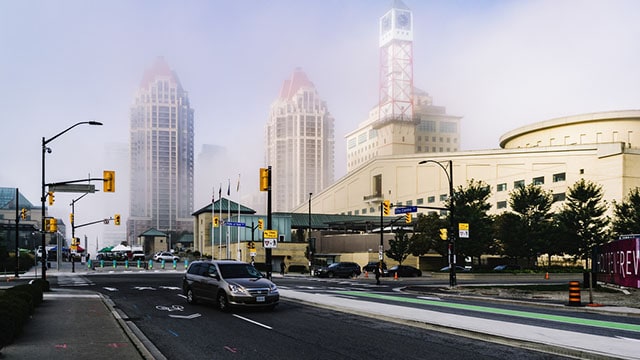Here’s how much taxes could climb in Mississauga soon
Published November 11, 2019 at 7:22 pm

As Mississauga grows, so do the costs associated with running a rapidly urbanizing city.
Fortunately for residents, however, the gradual expected increases in some fees and taxes will come with improvements to transit and other amenities, as well as a new community centre.
The City of Mississauga’s proposed 2020 – 2023 Business Plan and 2020 Budget is now available online.
According to the city, the total proposed 2020 operating budget is $926.1 million–an amount that will be offset by revenue from sources such as transit fares, recreation fees, and building permit fees. Those fees will total $387.4 million.
The property tax funds the budget amount not covered by these revenues.
If the proposed budget passes, residents will see a 3.84 per cent increase on the 2020 residential property tax bill. Of this, 1.74 per cent is for the city’s services and 2.1 per cent is for the Region of Peel’s services (based upon the proposed budget provided to regional council).
Every 1 per cent of city tax increase is about $19.50 per average home or $2.84 per $100,000 of assessment.
In October, the city said that some MiWay fares could also rise. Some increases that have been proposed include a slight increase to the MiWay cash fare (single adult). The city is actively encouraging Presto migration, but those who still prefer to pay cash can expect fares to potentially climb from $3.75 to $4.00 (a 6.7 per cent increase).
The Presto fare will remain at $3.10.
The proposed 2020 net operating budget is $538.7 million – about $27.8 million higher than the 2019 Budget.
The 2020 expenditure budget is targeted to keep the city’s services operating at current levels including:
- MiWay – Ontario’s third-largest municipal transit service, MiWay operates 79 routes with 500 buses; customers board a MiWay bus over 57 million times per year
- Fire and Emergency Services – responds to an average of 30,000 incidents each year; conducted 9,256 fire safety inspections in 2018 to ensure Fire Code compliance and completed 1,703 building permit applications to ensure compliance with fire and life safety requirements in the Ontario Building Code
- Roads – keeping motor vehicle, pedestrian and bike traffic moving on the city’s 5,660 lane kilometres of road network; maintaining a cycle network that includes approximately 570 kilometres of multi-use trails, park paths, bicycle lanes and signed bike routes
- Parks, Forestry & Environment – maintaining 3,154 hectares of parkland and open space, including city-owned trees, 371 sports fields, 265 playgrounds, two marinas and 11 publicly-owned cemeteries
- Library Services – includes the Central Library and 17 branch libraries that saw 4.3 million in-person visits and 6.1 million loans in 2018 including digital loans; 152,000 people attended library programs in 2018
- Recreation – providing over 200,000 hours of programming such as swimming, fitness, skating and more each year; accommodated 13 million visits last year to Recreation facilities, including 11 community centres
The city also plans to add $4.6 million worth of new services.
The city says residents can expect to see MiWay service growth, with the addition of 32,600 service hours. The city also says MiWay will be providing some new services, streamlining routes, integrating transit hubs, improving off-peak service levels and addressing overcrowding on existing routes
Residents can also look forward to the opening of the Churchill Meadows Community Centre. The centre will include a triple gymnasium, indoor pool, warm water therapeutic tank, multi-purpose spaces, a teaching kitchen and change rooms that will service the adjacent sports fields and seasonal dome.
The city also says it plans to increase public safety by introducing attendants at the Celebration Square fountain to allow for first aid support.
The city says it will be modernizing library technology by enhancing online access, supporting the repair and replacement of the musical instrument lending library and expanding Mississauga Maker learning opportunities.
As far as traffic safety goes, the city says it will be adopting Vision Zero, a framework which focuses on the prevention (and ultimately the elimination) of pedestrian, cyclist and motorist injuries and fatalities on the city’s roads
The city will also be using funds raised through Mississauga’s Municipal Accommodation Tax (MAT or hotel tax) to fund culture grant programs.
The proposed stormwater rate per billing unit for 2020 is $108.20, effective April 1, 2020. The city has over 2,100 kilometres of storm sewer pipes, over 51,000 catch basins, 250 kilometres of ditches, 32 creeks and 64 Stormwater management facilities in its drainage system, at a total replacement value of close to $2.2 billion
On Nov. 18, 2019, at 9:30 a.m. the Budget Committee will begin discussions on the proposed 2020 Business Plan and Budget.
Here’s an overview of the 2020 preliminary Business Plan & Budget that was presented to Budget Committee on June 26, 2019.
insauga's Editorial Standards and Policies advertising





